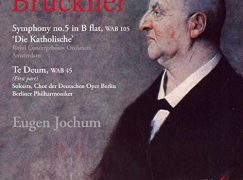Was Anton Bruckner a Catholic?
mainThis record label seems to think we need reminding that he was.

The fifth symphony has been variously referred to as the Tragic, the Church of Faith or the Pizzicato. Bruckner liked t call it the Fantastic.
This is the first time we have seen it called ‘the Catholic’.
And while we’re on the subject, is the Pope one?






In these days of hysterical witch-hunting that was a very provocative blog post when we think about the composer’s problematic interest for teenage girls and dead bodies. As for the current Pope I am not sure he is a real Catholic, however infallible.
Some Catholics believe that the last really Catholic pope was Pius XII. as for Bruckner he thought he was.
I knew about Bruckner’s interest in teenage girls, but dead bodies…?
Check this:
https://www.theguardian.com/music/2014/apr/01/sex-death-dissonance-anton-bruckner-concertgebouw-orchestra
Thanks fort the link!
….the latter is such an Austrian thing!!!:-)
Bruckner most likely had OCD Sue, he counted the notes, bars in his symphonies, the tiles on the Hofburg roof. His music does not flow naturally like Brahms because he spent far too long with Simon Sechter’s Counterpoint text book. If you cobbled the first movement of his 4th, the Scherzo of the 9th, the adagio of the 7th and Finale of the 8th you might have a half good symphony with consistent tunes, I taped them and made a compilation, it works!
Oh yes Bruckner went to see the corpses after a big fire in Vienna, he also jumped into LVB’s grave when he was being moved from Wahringer to the Zentralfriedhof. He held his skull aloft saying what made you so deaf?
According to Jan Swafford in his biography of Brahms there’s a suggestion from Brahms that Bruckner was being abused as a choir boy.
Yes, Sue, I am inclined to believe that as well. The low-self esteem and social awkwardness and OCD.
Bruckner I am sure would be at home in the Emerald Isle. In Ireland we have a quaint custom regarding death and the funeral ,that only one person in a grave yard can go to heaven so if two people die on the same day, the last one in has to wait until tomorrow.
https://www.youtube.com/watch?v=-kL6wjjkDYI
For some entertainment, do a websearch on “Are Catholics Christians”. But that all supposes that JC was more than a purely mythical figure modelled on dozens of pre-existing man (or woman)-gods from pagan history.
Perhaps a more interesting one: “Vatican Bank transparency”. Follow the money.
It seems unlikely that Jesus did not exist. That is not to say that all of the beliefs that Christians have about Jesus are accurate, but only that the evidence suggests that there was a historical person called Jesus. As historical fact, I discount entirely claims such as that Jesus was the incarnate second person of the Holy Trinity, that he was conceived of the Holy Spirit and born of a virgin, that he performed miracles, that he was transfigured, and that he rose from the dead, lived on earth for another 40 days, and finally ascended into heaven to sit on the right hand of God the Father until he comes again to judge the living and the dead. All those claims are wholly supernatural and cannot be considered historical facts.
What we do know, however, from both Christian and non-Christian sources, is that within the few decades immediately following Jesus’ death (i.e. from around 30 CE until the mid 60s CE) there existed a growing community of believers, some of whom had apparently known Jesus directly during his lifetime (hence why this period is known as the apostolic period of the history of Christianity). We know that people who may have known Jesus, or who certainly knew people who had known Jesus, began to write accounts of his life during this period. These accounts in part formed the basis of the canonical gospels, the earliest of which was probably composed during the seventh decade of the first century, i.e. around 35 years after Jesus’ death. At least some of the catholic epistles also seem to have been written by people who knew Jesus.
While many of the supernatural beliefs about Jesus undoubtedly are derived from a combination of Jewish and pagan sources, there also seems to be little or no space for doubt as to the historical existence of Jesus. How else do you account for the origins of a substantial community of people who established a successful Jewish sect, and eventually a new religion, based on Jesus’ teachings, his alleged miracles, and the circumstances of his death? The most likely explanation surely is that Jesus was simply the most successful of, no doubt, a substantial number of similar Jewish teachers to whom various miracles were inevitably ascribed in keeping with the beliefs that were commonly held at the time. It is entirely plausible that such a person would have ended up being crucified by the Roman authorities, and, indeed, it is quite likely that other, less well known, Jewish teachers and reputed wonderworkers, as well as pagan magicians, would have met a similar fate. The question, therefore, is not whether a person of this sort named Jesus existed (for this seems an entirely unremarkable likelihood), but why his followers were uniquely successful in perpetuating his cult following his again entirely unremarkable death.
“little or no space for doubt” is overly confident, afaik:
https://www.alternet.org/belief/5-reasons-suspect-jesus-never-existed
(just a short essay as a starting point for further reading)
but of course you are right:
the historicity of jesus is irrelevant to the effects the cult in his name had and still has on the world.
An interesting article, although I cannot say that I am convinced.
It doesn’t particularly concern me that there is no first-century pagan or non-religious evidence that attests the existence of Jesus. Most extant contemporaneous written evidence attests the existence of people of high social status (e.g. senators, equestrians, and curials), people of lower social status employed in public service (e.g. soldiers), and finally people who happen to be recorded in documents (e.g. contracts or court proceedings) that have been preserved by chance (e.g. papyri preserved in desert conditions). Given that Jesus was a peregrine who father was an artisan it doesn’t surprise me that there is no record or his birth or death. Similarly, the vast majority of accounts of criminal trials are lost to us. It’s hardly surprising that there are no extant accounts of an Aramaic-speaking religious teacher in one of the remotest provinces of the Roman Empire.
It’s not surprising that Paul doesn’t use his letters to record details of the life of Jesus: that isn’t the purpose of his writing. Paul’s concerns are the Church’s mission, ministry and discipline within congregations, and points of doctrine and ethics. It’s reasonable to think that he assumes that Christians know about the life of Jesus from oral tradition and early written sources later incorporated into and superseded by the Gospels. It therefore doesn’t concern me that the Gospels are not written by eye-witnesses, that they contradict each other, or that they can be interpreted in a variety of different ways. Proponents of the historical existence of Jesus claim only that around 30 CE there was a Galilean Jewish teacher called Jesus who was crucified by the Romans. Given, for example, that Jesus quite obviously didn’t actually rise from the dead, it hardly matters that the Gospels cannot agree about exactly how it took place.
There is evidence for the existence of an historical figure called Jesus by near contemporaries, and some of these were not Christians. In fact there is more evidence for the existence of Jesus than several Roman emperors. Of course, this says nothing about the whether the Christian figure of the bible is true or not. And it is also well known that the story about the biblical figure evolved between Paul’s letters and John’s gospel (none of which are intended as an historical narrative of the life of Jesus). But there really isn’t much doubt that these biblical stories are based on a real historical figure, who lead a small religious community, and who died in around 30AD.
The Pope discussing the existence of god with an atheist told him he was like a man in a darkened room, totally blind folded looking for a black cat that is not there.
https://www.youtube.com/watch?v=GS3BZs5fx3Q
God, what an ugly bugger. No wonder he couldn’t persuade any teenage girl to marry him.
All the heterosexual men were ugly back then.
umm…. well, not all of them perhaps. Liszt comes to mind, who was handsome as a young man, and who remained good looking and impressive well into his 50s. There were surely others too…
Brahms was also very handsome when he was young. But then…(because of the beard, I think.)
Yes, Brahms was beautiful and Swafford is full of anecdotes of women swooning in their droves. Swafford speculated that because of Brahms’s high voice and its somewhat effeminate allusions that he grew a beard in order to appear more masculine. But Brahms detested the music of Bruckner.
Brahms was hauled about the bars and beer halls of Hamburg by his Dad aged 13. The saloon girls poured beer into him and pulled his drawers off according to the Swafford biog. He must also have had some mental issue though not as bad as Bruckner.
In my most humble of opinions, Brahms is the music equivalent of the pub bore whilst Bruckner is its astronaut.
Silly young girls often swoon over unsuitable men and fail to notice and sometimes even despise the real deal.
As far as I’m aware there is no more evidence that the young Anton was ‘abused as a choirboy’ than the grumpy old Johannes was an active gay paedophile.
…unlike you, whose charm would sway any underage girl…
Thank you, you are too kind. But seriously, couldn’t they find a more flattering portrait to use on the CD cover?
Bravo.
It’s an unusual hairstyle for his time. Most men with a full head of hair like him weren’t cutting it so close.
Perhaps he was trying to to appear monastic?
Yes,he was.
Well there is this: ‘Bruckner’s 5th symphony, composed during a time of difficulty and disillusionment, has been interpreted as conveying a message of hope and faith; and is sometimes referred to as the composer’s “Catholic” symphony.’
http://www.the-wagnerian.com/2012/06/dvd-release-claudio-abbado-bruckners.html
Perhaps the more meaningful question would be to what extent did Bruckner’s Catholicism influence his music. Yes, obviously in his sacred music, but the evidence may be ambivalent in the mighty symphonies. (And yes, he did dedicate the Ninth to God, no less simply in the hope that Bruckner would be granted the time to complete it.) what informed Bruckner may be just his sense of pure music. I suppose we could have the same discussion with respect to what extent did Mahler’s Jewishness influence his music or Sibelius’s being Nordic influenced his symphonies.
Mahler’s chosen Christianity and Pantheism seems more evident in his work than his inherited Jewishness.